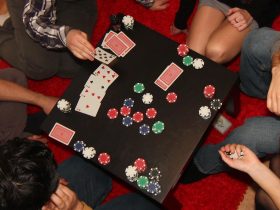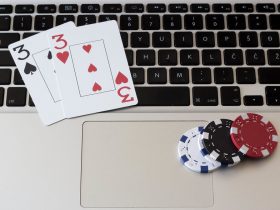Poker has evolved from smoky saloon tables to online platforms hosting global tournaments worth millions of dollars. It’s not just a game of luck but a discipline combining strategy, probability, and psychology. Whether you’re playing Texas Hold’em, Omaha, or Seven-Card Stud, understanding the underlying structure of poker is essential to mastering it. This guide explores the strategic depth of poker, delving into reading opponents, mathematical reasoning, emotional control, and advanced play styles that separate professionals from amateurs.
Understanding the Core of Poker
At its essence, poker is a game of incomplete information. Each player knows their own cards but must infer the rest from betting patterns and behavior. The goal is to make the best possible hand or to convince others that you have it through skillful bluffing. Success depends not on the cards you’re dealt, but on how you play them.
The Foundation of Poker Strategy
The bedrock of all poker success lies in three fundamental concepts: position, pot odds, and player perception.
- Position – Your place at the table relative to the dealer button determines how much information you have before acting. Players in later positions have an advantage because they can observe the actions of others before making decisions.
- Pot Odds – Understanding pot odds allows players to calculate whether a call or raise is mathematically justified. It’s the ratio between the size of the pot and the cost of a contemplated call.
- Player Perception – The ability to understand how your opponents view you can shape your strategy. If they see you as tight and conservative, a sudden bluff becomes more credible.
The Psychology Behind Poker
Poker is as much about people as it is about cards. Emotional intelligence and psychological control often determine the winner more than sheer mathematical skill.
- Reading Tells: Subtle cues such as breathing patterns, eye contact, chip movement, or timing can give away a player’s intentions.
- Bluffing: A well-timed bluff exploits an opponent’s assumptions. The best bluffs are supported by a consistent story that aligns with prior bets.
- Tilt Management: “Tilt” refers to emotional frustration that leads to irrational decisions. Mastery of poker requires emotional resilience and discipline to stay calm after losses or bad beats.
The Role of Probability and Mathematics
Every hand of poker involves probabilities that dictate rational decisions. The top players calculate the expected value (EV) of each action, balancing risk against reward.
- Hand Equity: This measures how often your hand is expected to win against another.
- Implied Odds: The potential earnings from future betting rounds influence whether a current call is profitable.
- Game Theory Optimal (GTO) Play: GTO is a mathematical strategy that seeks to make your play unexploitable, blending balanced aggression and defense.
Advanced Poker Strategies
Understanding Table Dynamics
Each poker table develops its own rhythm and personality. Some are loose and aggressive, others tight and cautious. Adapting to the table dynamic is essential.
- Loose Tables: Play tighter, value bet more, and avoid excessive bluffing.
- Tight Tables: Expand your range, apply pressure with calculated bluffs, and exploit predictable players.
- Aggressive Tables: Use trap plays, slow-play strong hands, and capitalize on overconfidence.
Bluffing and Semi-Bluffing
Bluffing is not random deception; it’s calculated manipulation. The best players use semi-bluffs, betting with hands that are not yet strong but have potential to improve. This gives two paths to victory: forcing a fold or hitting a strong hand.
Effective bluffing depends on:
- Table image consistency
- Bet sizing that matches the story of your hand
- Awareness of board texture (how coordinated the community cards are)
Bankroll Management
No poker player survives long without strict financial discipline. Variance can be brutal, and even the best professionals endure losing streaks.
- Set a budget: Never play with money you can’t afford to lose.
- Maintain at least 20–40 buy-ins for the stakes you play.
- Move down in stakes when your bankroll drops below safety levels.
This principle separates professionals from gamblers. In the long term, consistent bankroll management ensures stability and longevity in poker.
Online Poker and the Modern Era
The digital revolution has reshaped how poker is played and studied. Online poker allows for thousands of hands per session, accelerating learning and offering access to global opponents.
Benefits of Online Poker
- Volume and Experience: Online platforms let players practice at scale, refining their decision-making faster.
- Data Analytics: Tracking software helps analyze win rates, leaks, and tendencies.
- Accessibility: Players can join games anytime without geographic limitations.
Challenges in Online Poker
However, online poker introduces its own set of challenges.
- Lack of Physical Tells: With no body language to read, players must rely on betting patterns and timing.
- Multitabling Fatigue: Playing multiple tables can strain focus and increase mistakes.
- Game Integrity: Ensuring fair play through secure, regulated platforms is crucial.
The Role of Discipline and Mindset
The mental game is where elite players truly separate themselves. Poker rewards patience, composure, and adaptability.
- Focus: Distractions destroy bankrolls. Professional players maintain concentration for hours.
- Adaptability: Adjusting to different opponents and conditions keeps your strategy fluid.
- Emotional Detachment: Treating every hand as part of a larger journey prevents emotional overreaction.
Training the Poker Mind
Success in poker is not a one-time achievement but a continuous process. Top players engage in deliberate practice, reviewing hands, studying theory, and learning from others.
Practical tips for improving mental performance include:
- Reviewing session data after each game
- Using meditation or breathing exercises before playing
- Maintaining a balanced lifestyle with proper rest and nutrition
Poker Etiquette and Professionalism
Professionalism defines long-term respect in poker circles. Whether in casinos or tournaments, proper etiquette enhances the experience for everyone.
- Respect fellow players: Avoid taunting or criticizing opponents.
- Act in turn: Premature action reveals unintended information.
- Manage time: Slow play should be strategic, not discourteous.
- Handle wins and losses gracefully: Celebrate moderately, and never berate bad beats.
The Evolution of Poker Tournaments
Tournaments bring out the highest level of skill and drama. From the World Series of Poker to private cash events, structured competition has made poker a spectator sport.
Tournament Structure
- Freezeouts: Players are eliminated once they lose their chips.
- Rebuys and Add-ons: Some formats allow players to buy back in for a set period.
- Satellites: Smaller tournaments that serve as qualifiers for larger events.
Each structure demands different strategic approaches, especially concerning chip preservation and aggression timing.
Common Poker Mistakes to Avoid
Even seasoned players occasionally fall into traps that cost them chips and confidence. Avoiding these errors can dramatically improve your results.
- Playing too many hands out of position
- Ignoring pot odds and overvaluing weak draws
- Bluffing too frequently or not enough
- Allowing emotions to influence decision-making
- Failing to adapt strategy to changing table conditions
Recognizing and correcting these patterns is the path to mastery.
Real-Life Impact of Poker Skills
Poker teaches valuable real-world lessons. The same principles that guide great players—risk management, strategic thinking, emotional intelligence—apply to business, leadership, and personal growth.
- Risk Evaluation: Every decision involves balancing potential gain against potential loss.
- Patience and Timing: Waiting for the right opportunity is often more profitable than constant action.
- Emotional Control: Handling setbacks without panic or anger enhances decision-making under pressure.
FAQ
What’s the best way to start improving my poker game?
Start by focusing on position, hand selection, and understanding pot odds. Study your own play regularly and review both winning and losing hands to identify patterns.
How do professional players handle losing streaks?
They view them as part of variance. Professionals rely on data, not emotion, and often take breaks to regain clarity rather than chasing losses.
What’s the difference between online and live poker strategy?
Live poker emphasizes reading body language and table talk, while online poker focuses more on timing, bet sizing, and statistical analysis due to the absence of physical cues.
Is poker purely a game of luck?
No. While short-term outcomes involve luck, long-term results are dominated by skill, discipline, and decision-making consistency.
How long does it take to become a professional poker player?
It varies. Dedicated players studying theory, math, and psychology can reach advanced levels within a few years, but consistent success requires thousands of hours of practice and experience.
Can poker help in real-life decision-making?
Absolutely. The strategic reasoning, emotional discipline, and probability-based thinking in poker translate effectively into business, investing, and leadership.
This comprehensive look at poker underscores that mastery extends far beyond the cards. It’s a lifelong pursuit of knowledge, composure, and adaptability—a dynamic balance between mathematics, psychology, and human intuition. Those who embrace this depth discover that poker is not just a game; it’s a reflection of life’s most strategic choices.











